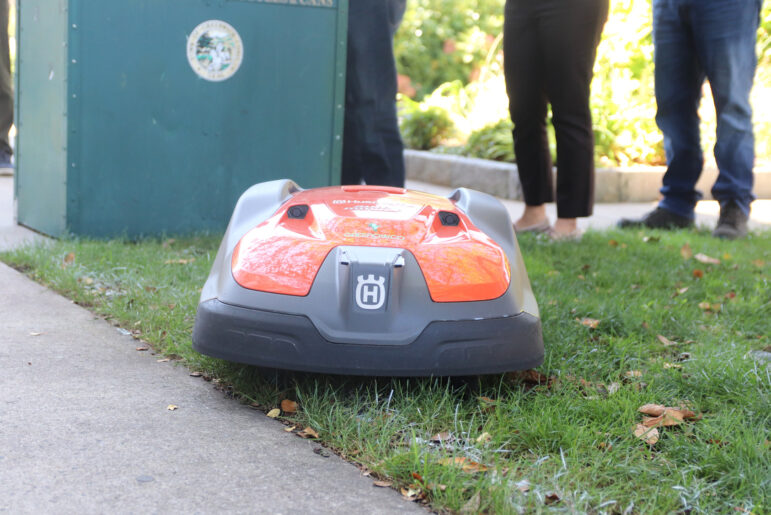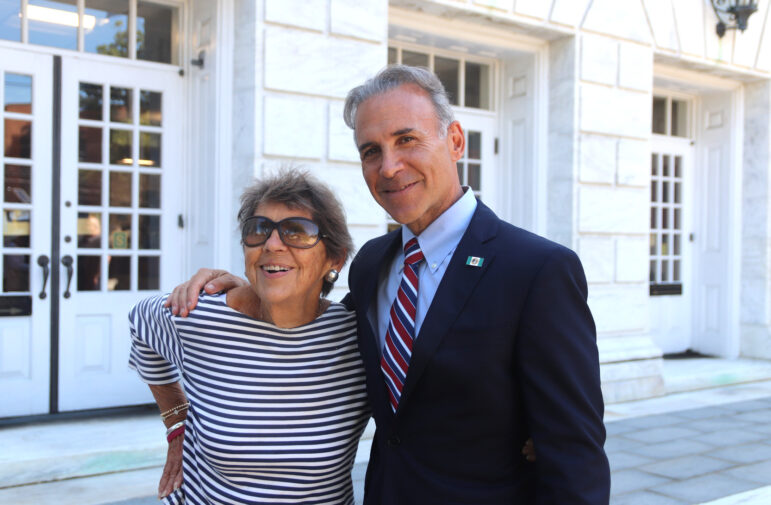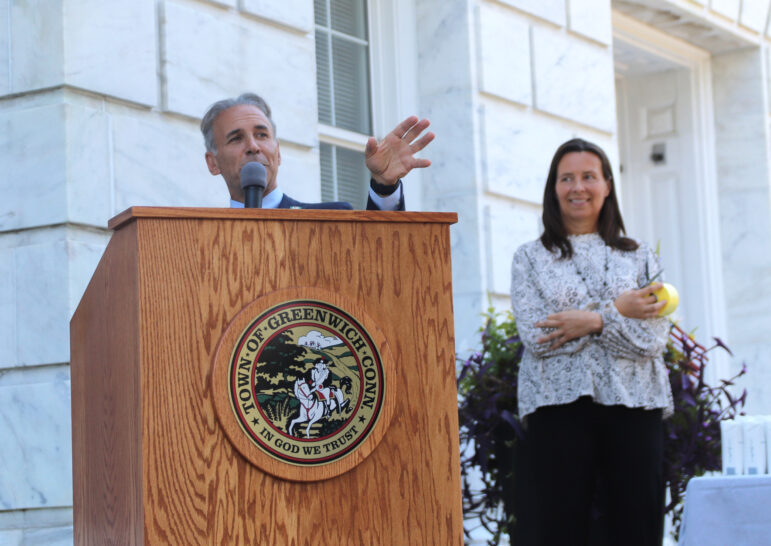Residents may have noticed a cordless orange machine making its way around the lawn at Greenwich town hall lately. The machine, known as “Farmer Joe” is a battery operated lawn mower that works on a timer inside boundaries created by underground wires.
During a ribbon cutting and demonstration on Wednesday, Farmer Joe quietly navigated the lawn, clipping just the tips of the blades of grass and leaving them as they fell to serve as natural fertilizer.
Contrast that with the image of landscapers trucking piles of grass clippings to the dump where they release CO2.
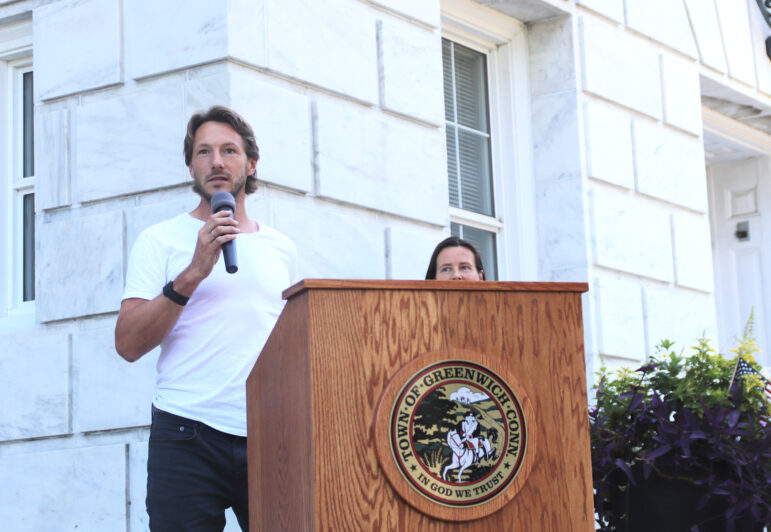
Eric Horn, founder of company Greenow said Farmer Joe works on a timer.
“Some people like to wake up in the morning with a perfectly trimmed lawn,” he said.
Mr. Horn said not only is Farmer Joe very quiet, but the machine expels no fumes.
And, while landscapers haul bags of grass clippings to the dump where they release CO2, Farmer Joe’s small trimmings are left on the lawn and act like a natural fertilizer.
Farmer Joe is not a leaf mulcher, but the machine clips the tips of the blades of grass, which is why you won’t see a layer of clippings across the lawn after he does his work.
Asked about concerns a thief might swipe the machine, Mr. Horn said Farmer Joe has a GPS system, so a thief wouldn’t get far!
There are different sizes of Farmer Joe machines, ranging from the larger commercial version on the town hall lawn, down to smaller versions for residential lawns.
The machine operates inside a parameter requiring wires be installed underground. Hence the lines around the edge of Town Hall lawn.
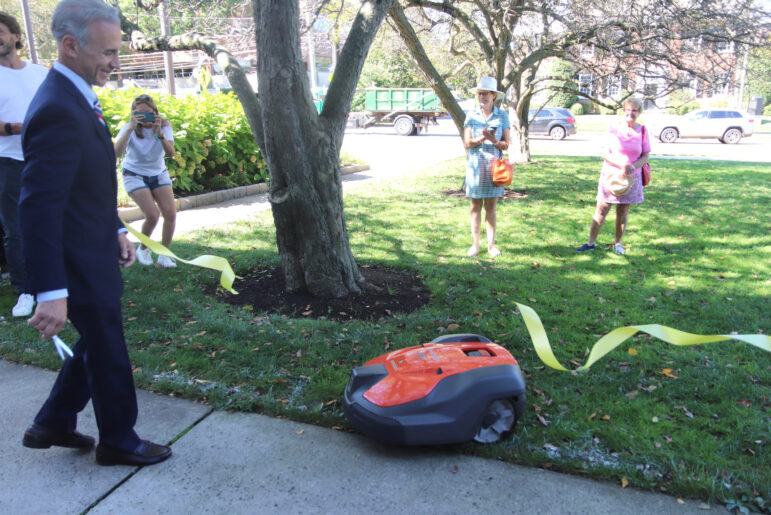
“Also he will dramatically reduce work related injuries in terms of mowing,” Horn added. “There’s no human beings on a big mowing machine.”
Horn said the robotic mowers are so quiet that they’ve become very popular outside of retirement homes and hospitals.
“Battery operated equipment will replace all gasoline powered equipment. But the question is time – we really don’t have any time to wait,” he said.
“This is the future,” said First Selectman Camillo, who went on to praise the Teamsters who supported the initiative. He noted that Farmer Joe would free up time for staff to get to more projects.
Roger Taranto from Teamsters union Local 456, said the union supported the effort.
“It’s a change in technology. It’s the future. Our members look forward to being educated on how to install and maintain the equipment. It’s just another tool for them.”
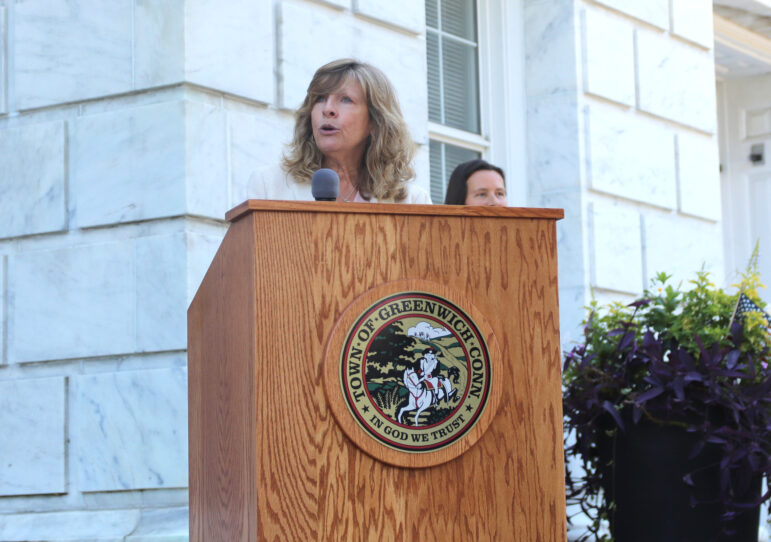
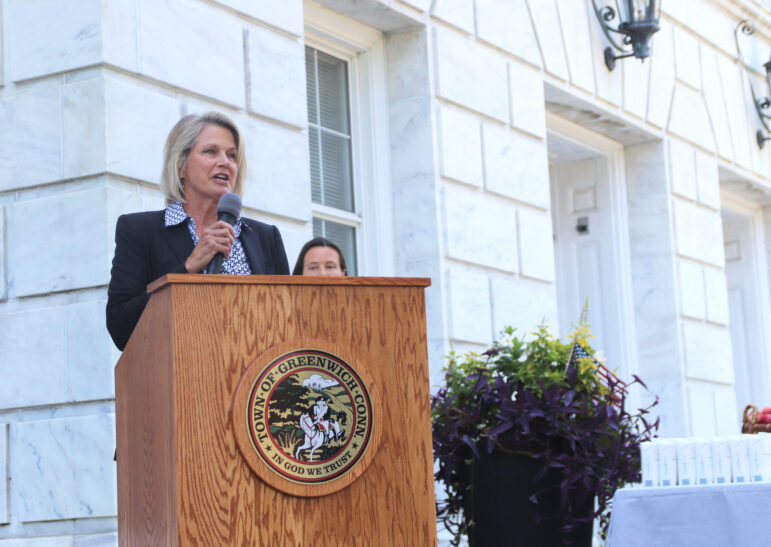
Jane Brash from Quiet Yards Greenwich said the town was on the “cutting edge” of lawn care technology. Her organization’s mission is to improve residents’ ability to enjoy their properties without constant noise and toxic fumes.
A typical gas leaf blower running for 30 minutes produces more pollution than a pick up truck driving 3,900 miles.
As an endless stream of noisy trucks rumbled down Field Point Road, Ms Brash said Fairfield County has some of the worst air quality in the country. The EPA cited southwest CT for not achieving minimum air quality standards with the status of “Severe Non-Attainment.”
To find QuietYardsGreenwich.com has a wealth of information, including a list of local landscapers businesses that offer quiet, electric landscaping services.
Pat Sesto, Greenwich’s Director of Environmental Affairs, who is in charge of watching the town’s water supply, talked about breaking the habit of constant lawn watering.
Sesto said the best way to conserve water is to decrease the amount of land dedicated to lawns.
“When we water our lawns, our irrigation comes from our potable water supply, a finite resource,” Sesto explained. “”Whether you are on a well or are on public water, you can drink that water just as easily as you can cast it around your landscape.”
Greenwich has 8,000 acres of lawn. Since 1985, the town has lost 858 acres of forest. Of those 858 acres, 442 acres were added to the inventory of lawns.
One square foot of lawn takes a half gallon of work to maintain on a weekly basis.
A third of household water goes to lawn irrigation. And of that amount, 15% is lost to evaporation, wind or runoff.
“The wastefulness that comes with irrigating our lawns is just incredible,” Sesto said. “In summer our water use in Greenwich scales up so that we use twice as much as Stamford despite having half the population.”
How Can We Do Better?
Meadows are largely self-sufficient by year three. They are in sync with our weather patterns and they don’t need supplemental water.
She said that for residents who don’t want to get rid of their lawns, she recommends watering only as needed.
“One drawn out watering a week to soak the soil is preferable to multiples days,” she said. “If you do feel the need to water, water in the morning. Timing makes a big difference; 40% of our water can be lost to evaporation later in the day.”
The value of having less lawns means having more diversity on our properties. Forests and meadows attract bugs and birds, yet don’t require watering.
Rusty Parker from the Greenwich Tree Conservancy explained that not only are trees beautiful, but they provide shade and habitat for birds and insects, as well as absorb water during heavy rain seasons. They also make oxygen out of CO2.
The GTC has planted about 5,000 trees since its founding 15 years ago. They have a goal of planting about 500 more trees per year on town property.
Aleks Moch from the Conservation Commission said ideally lawns would be replaced with native trees, shrubs and flowering plants.
Janet Stone McGuigan and Myra Kockenbrink from the Sustainability Committee said they loved Farmer Joe, but will give him a rest in May for “No Mow May.”
Klockenbrink reminded the crowd of the climate change resolution that charges the town with creating a climate action plan by the end of 2023.
“Greenwich has stepped onto the path toward a coordinated response to climate change,” she said. “It has joined thousands of other towns in recognizing that without a plan the town is cannot be prepared or respond meaningfully to this challenge.”
Further, she said Greenwich is in a position to lead the region and be a model for what is possible when people plan and work together.
“Climate change can feel daunting and even overwhelming,” Klockenbrink said. “What I say, is focus on the good. We have a lot of smart people in this town – passionate volunteers and community leaders who move mountains to care for our environment, our quality of life and the future of our children.”
